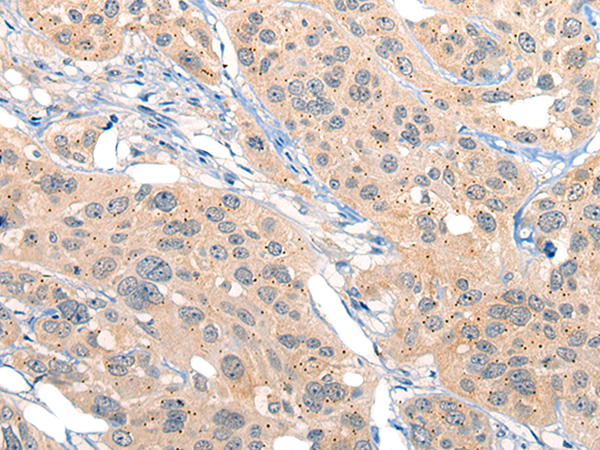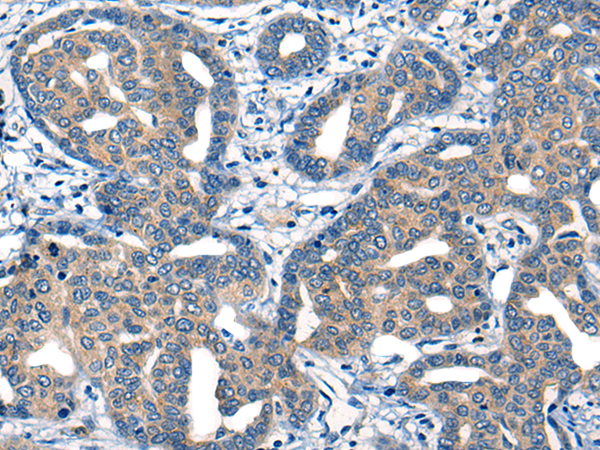

| WB | 咨询技术 | Human,Mouse,Rat |
| IF | 咨询技术 | Human,Mouse,Rat |
| IHC | 1/30-1/150 | Human,Mouse,Rat |
| ICC | 技术咨询 | Human,Mouse,Rat |
| FCM | 咨询技术 | Human,Mouse,Rat |
| Elisa | 1/5000-1/10000 | Human,Mouse,Rat |
| Aliases | IIP45 |
| Host/Isotype | Rabbit IgG |
| Antibody Type | Primary antibody |
| Storage | Store at 4°C short term. Aliquot and store at -20°C long term. Avoid freeze/thaw cycles. |
| Species Reactivity | Human |
| Immunogen | Synthetic peptide of human MIIP |
| Formulation | Purified antibody in PBS with 0.05% sodium azide and 50% glycerol. |
+ +
以下是关于MIIP抗体的3篇参考文献,涵盖其功能研究及抗体应用:
---
1. **文献名称**:*MIIP inhibits EMT and cell invasion in glioma by regulating EGFR/Akt/NF-κB signaling*
**作者**:Xie, F., Li, B., Zhang, Y., et al.
**摘要**:本研究通过制备特异性MIIP抗体,验证了MIIP在胶质瘤中通过调控EGFR/Akt/NF-κB信号通路抑制上皮-间质转化(EMT)和肿瘤侵袭的作用。抗体用于免疫组化和Western blot分析,结果显示MIIP低表达与患者不良预后相关。
---
2. **文献名称**:*Development of a monoclonal antibody against MIIP and its application in breast cancer prognosis*
**作者**:Wang, L., Chen, H., Liu, Q., et al.
**摘要**:研究团队开发了一种高特异性抗MIIP单克隆抗体,并通过ELISA和免疫荧光验证其结合能力。该抗体应用于乳腺癌组织微阵列分析,发现MIIP表达水平与肿瘤转移风险呈负相关,提示其作为预后标志物的潜力。
---
3. **文献名称**:*MIIP interacts with EGFR to suppress cell migration by blocking endosomal recycling*
**作者**:Zhang, Y., Li, X., Zhou, M., et al.
**摘要**:利用MIIP抗体进行免疫共沉淀(Co-IP)实验,揭示了MIIP通过与EGFR相互作用调控内体循环通路,从而抑制癌细胞迁移的分子机制。研究为靶向MIIP-EGFR轴的抗肿瘤策略提供了依据。
---
**备注**:若需更早期或特定应用的文献(如抗体开发技术细节),可进一步限定研究范围或补充关键词(如“MIIP antibody production”)。建议通过PubMed或Web of Science以“MIIP antibody”及“Migration and Invasion Inhibitory Protein”为关键词检索更多相关研究。
**Background of MIIP Antibody**
The Migration and Invasion Inhibitory Protein (MIIP), also known as IBEZ (Interacting with BRCA2), is a tumor suppressor protein first identified for its role in inhibiting cancer cell migration and invasion. MIIP is encoded by the *MIIP* gene located on chromosome 1p36.22. a region frequently associated with genomic alterations in cancers. Functionally, MIIP interacts with key oncogenic pathways, including Rac1 signaling, to suppress cytoskeletal reorganization and metastatic dissemination. It also regulates the stability and activity of hypoxia-inducible factor 1α (HIF-1α) and epidermal growth factor receptor (EGFR), further linking it to tumor progression and angiogenesis.
MIIP antibodies are essential tools in studying its expression, localization, and molecular interactions. Reduced MIIP expression has been observed in gliomas, breast, lung, and prostate cancers, correlating with poor prognosis. These antibodies enable detection of MIIP in tissues or cell lines via techniques like Western blot, immunohistochemistry, and immunofluorescence. Research using MIIP antibodies has highlighted its dual role in cell cycle regulation, particularly through binding to Cdh1 (a co-activator of the anaphase-promoting complex), thereby influencing mitotic progression and genomic stability.
Overall, MIIP antibodies are critical for elucidating its tumor-suppressive mechanisms and exploring its potential as a therapeutic target or biomarker in cancer diagnostics and treatment strategies.
×